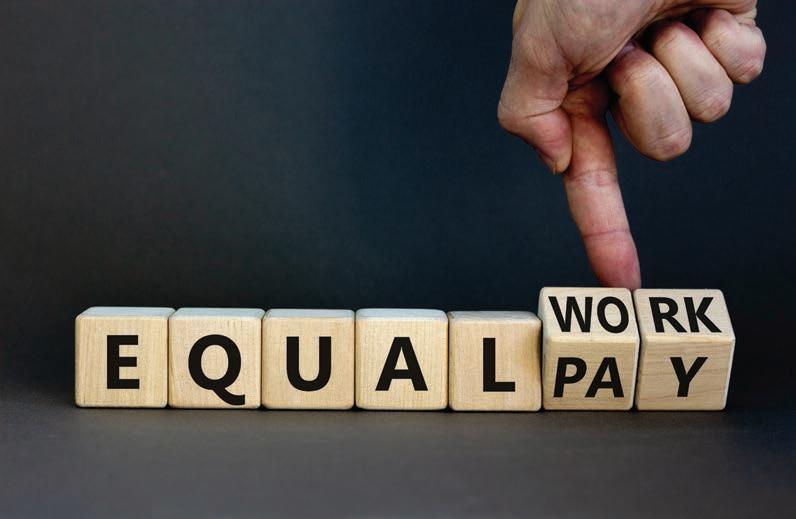
6 minute read
It’s time for part 2 of wage transparency laws
Equal Pay measure made big changes
BY TAMARA CHUANG THE COLORADO SUN
“How much does the job pay?” is no longer much of a mystery for job seekers in Colorado, thanks to a state law passed in 2019 and enacted two years later.
Other states have followed suit in recent months, including California, Washington and soon, New York. But Colorado’s law wasn’t perfect. And now, the Equal Pay for Equal Work Act is poised for an update from some of the state lawmakers behind it.
“ ough the Equal Pay Act is working well, with these additions, it will better serve workers and employers across the state,” said Sen. Jessie Danielson, a Democrat from Wheat Ridge, who was one of the prime sponsors of the original wage transparency law.

Pushback came from out-of-state companies that didn’t ignore Colorado’s new law — they just excluded candidates from Colorado. A Commerce City engineer created a site to track violators (it’s now archived). But there was also confusion among local employers about employee promotions and whether they had to advertise the new role to outsiders.
“ e complexity of the law, the confusion amongst employers, the problem of not addressing remote work situations, because they were not contemplated in 2019 when the original bill passed, needs to be addressed for the future of the workforce,” said Loren Furman, president and CEO of the Colorado Chamber. is bill aims to clear some of those things up. A draft shared with e Colorado Sun attempts to clarify the di erence between “career progression” for existing workers versus a “job opportunity.” e latter means a current or anticipated vacancy that needs to be lled. e former is a promotion as part of that type of job. Remote jobs are not addressed in the draft bill.
Danielson said she and other advocates, which include e Women’s Foundation of Colorado, have met with interested parties since spring to suss out their di erences. But their attempts to water down or remove protections for Coloradans who work remotely for out-of-state companies only threatens pay equity, especially for women.
“Excluding remote workers from the protections of the Equal Pay for Equal Work Act would negatively impact a valued and critical part of our workforce,” she said.
Impact of the Equal Pay law
When introduced four years ago, Colorado’s Equal Pay law sought to equalize pay for substantially similar work. It stemmed from data showing that women and people of color often earn much less than their white or male colleagues even in the same roles. In Colorado, women earned 86 cents for every $1 earned by men, according to a 2018 analysis by the Institute for Women’s Policy Research. e impact of these new policies isn’t yet known because the laws are young. It’s too soon. Existing research was deemed “not conclusive” by the Institute for Women’s Policy Research.
In an analysis of recent wage transparency studies, the organization found pay transparency laws help narrow the gender wage gap by reducing wage growth among top earners, who tend to be men. But, the analysis found, these laws do not necessarily increase women’s earnings. Two studies conducted in university settings found the salaries of women faculty members increased following the pay-transparency intervention. “Pay-transparency policies tend to rely on individual workers advocating for pay increases based on newly available information,” the analysis said.

But another measure of Colorado’s Equal Pay law is the impact in the United States, said Louise Myrland, vice president of programs at e Women’s Foundation of Colorado. New York City’s wage transparency law went into e ect in November. Several other states, including Massachusetts, Pennsylvania and South Carolina are considering legislation, according to the National Conference of State Legislators. Connecticut, Maryland, Nevada and Rhode Island have implemented laws similar to Colorado but they don’t require salaries to be listed.
“Colorado was the rst that made a big splash and got a lot of attention for requiring pay ranges and compensation information in job postings, we’re really leading the way,” Myrland said. “Today in 2023, because several other states have followed Colorado’s lead, about one in four workers nationwide now are covered by pay transparency laws.” e Women’s Foundation worked on the original law and new bill with lawmakers and other organizations that included the Colorado Women’s Bar Association and 9to5 Colorado, an organization representing working women. Danielson is joined by two of the three prime sponsors of the original bill, including Sen. Janet Buckner, an Aurora Democrat and Rep. Serena Gonzales-Gutierrez, a Denver Democrat. e fourth, Brittany Pettersen, is now a U.S. representative. Rep. Jennifer Bacon, also a Denver Democrat, is also a prime sponsor. e third, SpotOn Transact, a San Francisco-based payments company, paid a $16,000 ne in July based on violations related to 33 job postings that did not include compensation for jobs that could be performed in Colorado.
Equal pay stats: 631 complaints; Twitter, Lockheed fined Complaints about the existing wage transparency law are still coming in, though activity trailed o during the year, according to the state Department of Labor and Employment. e o ce that oversees it, the Division of Labor Standards and Statistics, received 631 complaints about violations, which included posts that shared no wages, didn’t include a description of bene ts or o ered too wide of a range (ranges must have a speci c bottom and top amount).
“Compared to the rst four months of 2022, the average number of monthly complaints in the last four months of 2022 decreased by almost 45%,” a labor department spokesperson said.
After giving the companies the chance to correct the issue, the vast majority did. e state wound up issuing citations for just four companies in 2022. ree were ned, including Lockheed Martin and Twitter. ose cases have not been publicly disclosed yet, but will be, according to the division.
New labor-related proposals have popped up just weeks into the new legislative session.
An already contentious one is House Bill 1118, the Fair Workweek Employment Standards bill. It would require employers to post worker schedules ahead of time and not penalize employees who say “no” to last-minute calls for help. And workers who do respond to last-minute schedule changes would receive a “predictability pay” bonus.
“When businesses provide workers with schedules 14 days in advance and provide at least 12 hours of rest time between shifts, it’s a win-win for employers and employees alike,” Nina DiSalvo, policy director at Towards Justice, said in an email. “Employees who can schedule child care, a second job or other responsibilities — plus know their income to budget to cover their bills — are happier, healthier, more productive and generate more pro t for the business.” at puts a burden on employers, so there’s strong opposition to the bill already. What about weather disruptions, asked Furman, with the Colorado Chamber. Personal employee emergencies? e bill as proposed is too punitive, she said.
“An employer can be sued for changing the schedule (without) a two-week advance notice,” Furman said. “It doesn’t contemplate a snow bomb or act of God or even just an employee that has an emergency or unintended absence. … It’s just amazing to me that they haven’t contemplated the scenarios in a state like Colorado that has such weather variations.”
So… more work to be done on this bill. It’s been scheduled for a committee meeting on Feb. 16.
Do we need more laws?
As of Jan. 27, with 62 responses to the latest What’s Working reader poll on what new laws interest you most, 37.1% support no new laws because we have too many. Another 22.6% are interested in laws related to retirement while 19.4% would perk up if there was a law that would raise their salary. Take the poll yourself at https://cosun.co/worklaws. e clear winner in the latest What’s Working poll about what new laws we need was “None. We have too many laws.” But at 37.1% of the incoming votes, it’s not the majority. I’m going to let this poll go for at least another week because I got jammed up this week. But here’s one suggestion:
“I would love to see a bill that lets the public see how much big companies pay their shareholders while causing consumer prices to skyrocket and keeping workers’ pay low.” is story is from e Colorado Sun, a journalist-owned news outlet based in Denver and covering the state. For more, and to support e Colorado Sun, visit coloradosun.com. e Colorado Sun is a partner in the Colorado News Conservancy, owner of Colorado Community Media.
We can nd out tidbits like this from publicly traded companies, which must report their pro ts. ere’s also the CEO pay ratio law, which reveals how wages of CEOs at public companies are often many times higher than their workers (here’s a searchable list). Two of the top three in Colorado — Liberty Latin America and Qurate Retail, where CEO-to-worker pay ratios are 1,055 to 1 and 686 to 1, respectively — are linked to retired cable TV mogul John Malone.









